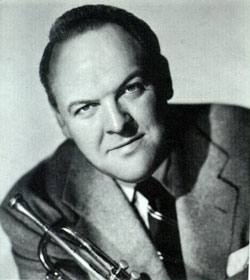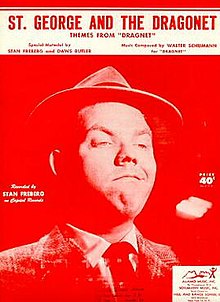
Dragnet is an American media franchise created by actor and producer Jack Webb, following Los Angeles Police Department (LAPD) Detective Joe Friday and his partners as they conduct by-the-book police work and solve crimes in Los Angeles. Originating as a radio drama on NBC in 1949, Dragnet has been adapted into several successful television shows and films, though the franchise's popularity has reduced since Webb's death in 1982. Its name is derived from the police term "dragnet", a system of coordinated measures for apprehending criminals or suspects.

John Randolph Webb was an American actor, television producer, director, and screenwriter, most famous for his role as Joe Friday in the Dragnet franchise, which he created. He was also the founder of his own production company, Mark VII Limited.

June Foray was an American voice actress and radio personality, best known as the voice of such animated characters as Rocky the Flying Squirrel, Natasha Fatale, Nell Fenwick, Lucifer from Disney's Cinderella, Cindy Lou Who, Jokey Smurf, Granny from the Warner Bros. cartoons directed by Friz Freleng, Grammi Gummi from Disney's Adventures of the Gummi Bears series, and Magica De Spell, among many others.

The Big Bad Wolf is a fictional wolf appearing in several cautionary tales, including some of Grimms' Fairy Tales. Versions of this character have appeared in numerous works, and it has become a generic archetype of a menacing predatory antagonist.

In a legend, Saint George—a soldier venerated in Christianity—defeats a dragon. The story goes that the dragon originally extorted tribute from villagers. When they ran out of livestock and trinkets for the dragon, they started giving up a human tribute once a day. And, one day, the princess herself was chosen as the next offering. As she was walking towards the dragon's cave, St. George saw her and asked her why she was crying. The princess told the saint about the dragon's atrocities and asked him to flee immediately, in fear that he might be killed too. But the saint refused to flee, slayed the dragon, and rescued the princess. The narrative was first set in Cappadocia in the earliest sources of the 11th and 12th centuries, but transferred to Libya in the 13th-century Golden Legend.
Corey Burton is an American voice actor. He is the current voice of Captain Hook, Ludwig Von Drake and others for The Walt Disney Company, Shockwave on The Transformers, Brainiac in the DC Animated Universe, Count Dooku and Cad Bane in the Star Wars franchise, Zeus in Hercules: The Animated Series and the God of War series, and Hugo Strange in Batman: Arkham City.

Stan Freberg was an American actor, author, comedian, musician, radio personality, puppeteer and advertising creative director.

Charles Dawson Butler, professionally known as Daws Butler, was an American voice actor. He worked mostly for the Hanna-Barbera animation production company and the Walter Lantz cartoon studio. He originated the voices of many familiar Hanna-Barbera characters, including: Yogi Bear, Huckleberry Hound, Snagglepuss, Quick Draw McGraw and Baba Looey, Augie Doggie, Loopy De Loop, Wally Gator, Snooper and Blabber, Dixie and Mr. Jinks, Hokey Wolf, Lippy the Lion, Elroy Jetson, Lambsy, Peter Potamus, The Funky Phantom and Hair Bear. While at Walter Lantz, he did the voices of: Chilly Willy, Smedley, Maxie the Polar Bear, Gooney and Sam in the Maggie and Sam series.

Edward William May Jr. was an American composer, arranger and trumpeter. He composed film and television music for The Green Hornet (1966), The Mod Squad (1968), Batman, and Naked City (1960). He collaborated on films such as Pennies from Heaven (1981), and orchestrated Cocoon, and Cocoon: The Return, among others.

George of the Jungle is an American animated television series produced and created by Jay Ward and Bill Scott, who also created The Adventures of Rocky and Bullwinkle and Friends. The character George was inspired by the story of Tarzan and a cartoon characterization of George Eiferman drawn by a cook on his minesweeper in the Navy during World War II. The series aired first-run for 17 episodes on Saturday mornings from September 9 to December 30, 1967, on the ABC-TV network. Then, rather than commissioning new episodes, the network was content to repeat the 17 episodes, keeping George of the Jungle on its Saturday schedule until September 1969 when it moved to Sunday mornings until September 19, 1970.

Joe Friday is a fictional character created and portrayed by Jack Webb as the lead for his series Dragnet. Friday is a detective in the Los Angeles Police Department. The character first appeared on June 3, 1949, in the premiere of the NBC radio drama that launched the series. Webb played the character on radio and later television from 1949 to 1959 and again from 1967 to 1970, also appearing as Friday in a 1954 theatrical release and a 1966 made-for-TV film.

Joseph K. Bevilacqua is an American actor, producer, director, author, dramatist, humorist, cartoonist, and documentarian.

Marvin Elliott Miller was an American actor. Possessing a deep baritone voice, he began his career in radio in St. Louis, Missouri before becoming a Hollywood actor. He is remembered for voicing Robby the Robot in the science fiction film Forbidden Planet (1956), a role he reprised in the lesser-known The Invisible Boy (1957).

Time for Beany is an American children's television series, with puppets for characters, which was broadcast locally in Los Angeles starting on February 28, 1949, and nationally by the improvised Paramount Television Network from 1950 to 1955. It was created by animator Bob Clampett, who later reused its main characters for the animated series Beany and Cecil. The show won three Emmy Awards for best children's show.
"Green Chri$tma$" is a comedy single written and performed by Stan Freberg and released by Capitol Records in 1958. Musical arrangement and direction is made by Billy May, and it is performed by the Capitol Records house orchestra. Other vocal performances are by Daws Butler, Marvin Miller, Will Wright, and the Jud Conlon Chorale.
Kenneth F. Nelson was an American record producer and A & R man for Capitol Records.

Peter Leeds was an American actor who appeared on television more than 8,000 times and also had many film, Broadway, and radio credits. The majority of his work took place in the 1950s and 1960s. Working with many well-known comedians, he became popular as a straight man to their antics.

Jerky Turkey is a 1945 Metro-Goldwyn-Mayer cartoon directed by Tex Avery. Jerky Turkey is one of three MGM cartoons in the public domain in the United States as its copyright was not renewed.
Dragnet was an American radio series, enacting the cases of a dedicated Los Angeles police detective, Sergeant Joe Friday, and his partners. The show took its name from the police term "dragnet", meaning a system of coordinated measures for apprehending criminals or suspects.














